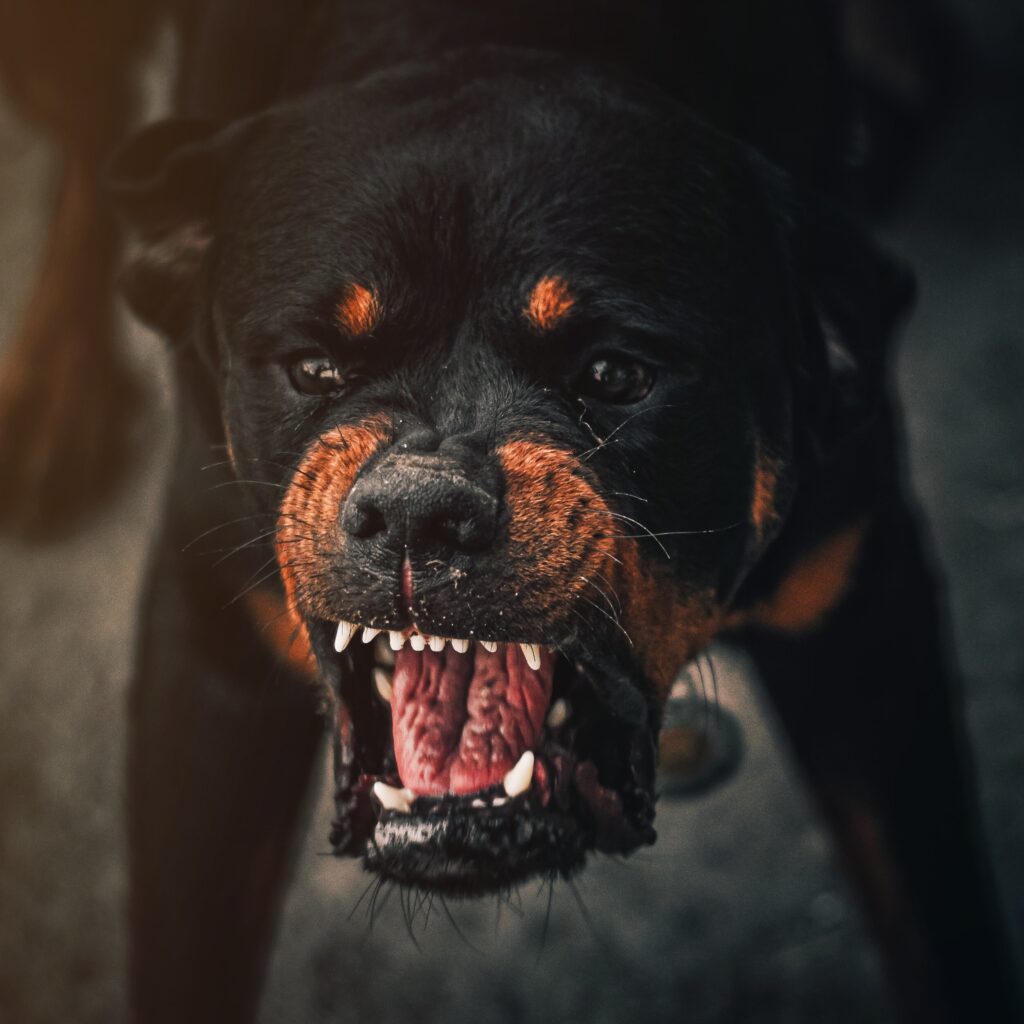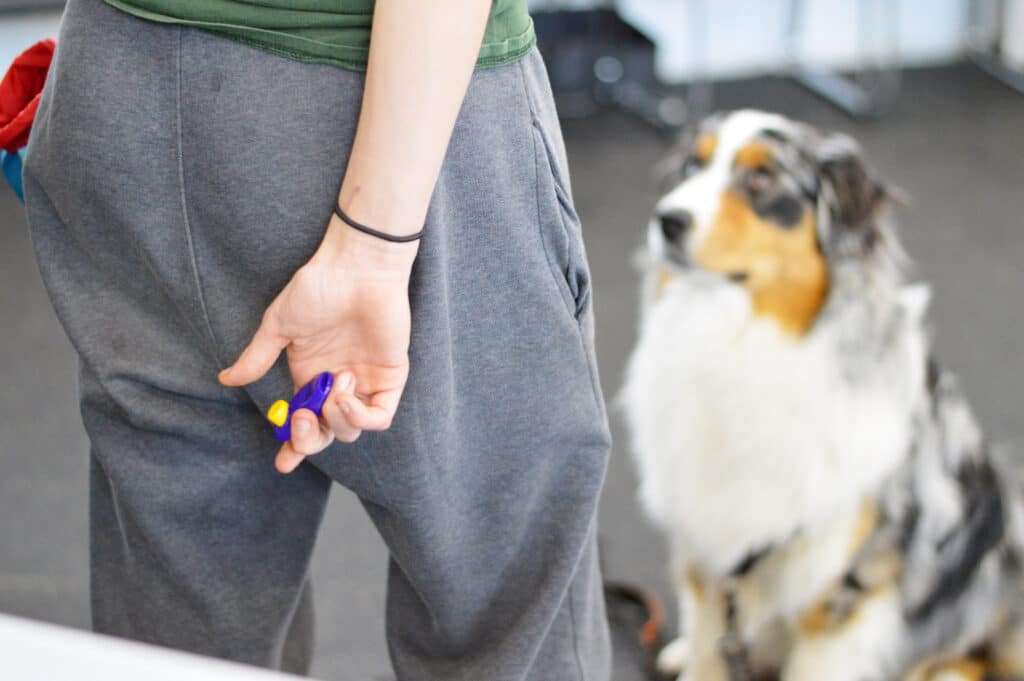Written by Rachael Johnston, CPDT-KA, KPA CTP, Family Paws Educator
If you are the owner of a leash reactive dog, you are not alone! In fact, many dog guardians in Toronto struggle with leash reactivity in their dogs. It is certainly not an uncommon sight in your average Toronto neighbourhood to see dogs on their daily walks barking and lunging at each other as they pass; while their handlers, frustrated and embarrassed, struggle to reign in their frantic dogs….
It is a reality that some dogs have a really tough time living in a highly urban environment where there is so much “stuff” to deal with all around them all the time. Dogs who are already on the sensitive side or have not been socialized to an urban landscape can have the hardest time of all dealing with the myriad of potentially stressful stimuli that surrounds them day to day. In the dogs that become overwhelmed by these feelings of stress or deep frustration, reactivity often is the result. And then there we are…. struggling to hold the leash of our stressed out dog as they frantically lunge and bark at the dog who just appeared across the street! What to do??

While reactivity in dogs may be a common challenge, it makes it no less frustrating or upsetting when it is ourselves who are the ones actually experiencing it. I absolutely know from personal experience the heartache of being the one holding the leash of a reactive dog. I have walked in those miserable shoes! However, I also know the joy of holding the leash of that same dog who now walks down the street unphased by all of the things he used to be bothered by!
It’s a great feeling!
The good news is: You can absolutely help your dog work through their reactivity challenge no matter if they are reactive to other dogs, to skateboards, to cats, to joggers etc. BUT…. You can only help them if you know the secrets to helping your dog overcome their reactivity.
Secret #1 – Learn How Dogs Learn!
When our dogs bark and lunge there is always a good reason for it (at least from their perspective)! In order for us to truly help our dogs succeed we must gain at least a basic understanding of why our dogs are behaving as they do.
Can you identify in your dog what they are trying to communicate when they engage in reactive behaviour? Might they be trying to make a scary thing go away? Or perhaps they are feeling frustrated that they can’t get closer to something interesting?
When we gain a better understanding of what our dogs are trying to achieve and communicate in their moments of reactivity we also gain an understanding of how to help them learn other ways of behaving when faced with stressful stimuli.
Secret #2 – Exercise Empathy
“Your dog is not being a problem. Your dog is having a problem.”
It can be easy to get frustrated in those moments when our reactive dogs lash out, however it is important to remember that your canine friend is struggling in those moments too. They don’t “feel good” when they are behaving this way. They are highly stressed and upset and they are dealing with these big feelings in the only way they know how.
What our dogs need most in those moments is understanding, patience and kindness. When your dog is reacting, there can be a lot of social pressure to make sure the people around you know that barking and lunging are not “appropriate” behaviours. However, the best thing you can do in these moments is calmly and quietly move away with your dog to give you both some breathing space. There is no need to put on a show for the people around you.

Secret #3 – Sound Training Mechanics
While understanding and empathy are essential to successfully helping your dog overcome their reactivity challenges they will get you nowhere unless you also learn HOW to train your dog. There are specific mechanical skills one must acquire and hone so as to skillfully, gracefully and artfully guide a dog to a calmer version of themselves.
I describe it as a well practiced dance between you and your dog involving clickers, treats, leashes and many moving limbs! As you get more skilled at this dance your training sessions become highly effective, smooth and seamless. Mechanically skilled trainers realize success with their dogs faster because they are the clearest communicators!
Our favourite beginners guide is this graphic from Lili Chin:
Secret #4 – Patience
Behaviour change takes time. I wish I could tell you that when you begin to learn how to teach your dog to respond more calmly and thoughtfully to their triggers their reactivity would then be resolved in a matter of weeks…
Folks, the fact of the matter is that we cannot put a timeline on how fast our dogs progress. We can help them learn to feel safer. We can help them learn different ways of responding to their triggers. But the rate at which that learning takes place is out of our control. If you stick to the training with patience and consistency you will see your dog begin to overcome their reactivity a bit at a time….Patience is key.
The most successful students pair patient, skillful, consistent training with good record keeping! It only takes a few minutes after a walk to write your observations of your dog’s behaviour in a notebook after you complete a walk. Or a simple spreadsheet with the day’s date and your findings will help you see how far you have come and will help you effectively plan your next successful outing!
Secret #5 – Love
Sounds “hokey” I know, I know! But I really mean it. Deep love of your dog and deep investment in their emotional well being truly is one of the essential ingredients for success when it comes to reactivity training. This is the feeling that drives dog guardians to get out there with their clickers and treats and commit to the practical hands-on training that is needed for success. It is also the feeling that has us reach out to our dogs with understanding and kindness when they are struggling. They need our love and our guidance to succeed.
There you have it! In my estimation and in my experience those are the essential secrets to helping a dog overcome their leash reactivity. I’ve lived it with my own dog and have helped many others walk the same path. It is a fascinating journey!
If you are ready to start integrating the above elements into your life with aspirations of helping your own dog overcome their leash reactivity we would love to have you join us for our Reactive Dog Group Class!
In these classes we explore the ‘whys” of our dogs’ leash reactivity and will help you develop and refine those critical handling skills to become effective and efficient trainers!
Join us to begin your journey!
